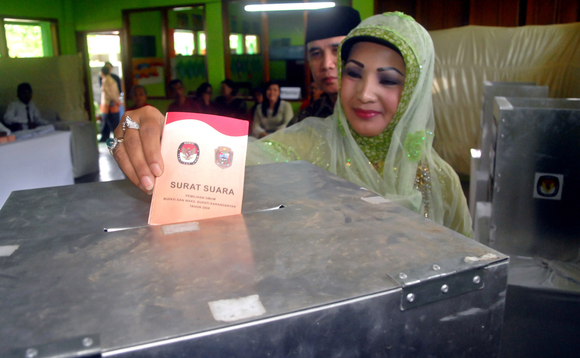
PE and elections: A vote of confidence?

Investors often cite elections as impediments to deal flow, as applications are delayed or applications held over until votes are counted. With Indonesia and India preparing for elections, what does it mean for PE?
As the only cleantech-focused GP in Southeast Asia, Armstrong Asset Management is well placed to tap into the region's growing renewables sector. The PE firm had closed a $30 million investment in solar and biogas projects being developed by Thailand-based Annex Power by the time its debut fund closed in November. A second soon followed, also in Thailand's solar space.
The GP has more deals in the pipeline and is particularly keen to make its mark on Indonesia's mini-hydro power segment. However, these transactions have yet to close, largely due to political developments in the country.
"We have been talking to some mini-hydro developers that we are interested in backing but some of them are delaying projects in anticipation of tariffs being increased post-election," says Andrew Affleck, founder and managing partner of Armstrong. "It is not across the board - some have decided to go ahead - but other developers want to wait because they think the economics will be more favorable."
The election Affleck refers to is Indonesia's presidential ballot in July. Once a legislative election is completed in April, the country will go to the polls and vote on a successor to President Susilo Bambang Yudhoyono, who is constitutionally barred from seeking a third term. His replacement is expected to introduce a raft of reforms.
Reform agendas
Elections - of which Asia will see three this year, in Indonesia, India and (probably) Thailand - are routinely cited by private equity players as a reason for slower deal flow. But is this perception borne out by the numbers? Broadly speaking, elections influence macroeconomic trends and the effect is not always negative. Yet the impact on PE and MA& deal flow is more nuanced than any broad statements on reduced activity might suggest.
"Our view is the election is can be positive for GDP growth but the impact is limited," says Eric Sugandi, an economist with Standard Chartered in Jakarta. "This year the economy will grow by 5.8% and election-related spend will likely add around 0.2%."
Most of this is due to increased consumer spending resulting from political campaigns. Sugandi adds that growth has historically picked up in the fourth quarter of the year preceding an election and the first quarter of the election year itself.
The have been other economic impacts. One of the more popular contenders for the Indonesian presidency is Jakarta Governor Joko "Jokowi" Widodo. When he was nominated as the Indonesian Democratic Party - Struggle's (PDI-P) candidate on March 14, the Jakarta Composite Index (JCI) rose to its highest level since September while the rupiah reached a 19-week high.
It is difficult to make generalizations about post-election impact when there have been only two ballots - in 2004 and 2009 - since Indonesia held its first free vote in 1999. However, in each instance the JCI rose sharply, suggesting renewed investor confidence.
AVCJ data shows little correlation between PE and M&A deal-flow and election cycles in Indonesia. The two quarters leading up to the 2009 election saw four private equity deals and 23 M&A transactions take place, similar to the comparable period in 2008. The two quarters leading up to the 2004 elections saw drop in the number of M&A transactions from 26 to 7 when compared to the previous year, while there were three more private equity deals.
Foreign direct investment (FDI) inflows totaled $4.8 billion in 2009, although this year followed the global financial crisis. FDI came to $1.8 billion in 2004 - the most in seven years - and this was followed by $8.3 billion in 2005.
Contextual analysis
The numbers should also be considered in the context of Indonesia's economic maturity, its appeal as a foreign investment destination and the size of its private equity industry. The stakes are higher in 2014 because there is potentially more money to be made, and the primary concern for PE players is whether the individual elected leader can deliver reform.
Veronica Lukito, co-founder of Ancora Capital, says the best result would be the election of a president who is supported by the party that wins a majority in the legislative poll. "The ideal would be a president and party that has the most popular support," Lukito says. "So far it seems the main parties are going to able to carry their own weight without having to form a coalition."
This ability to bring about reform is especially important to those sectors where government policy has the greatest influence. In Indonesia these include areas such as energy, infrastructure and mining.
Armstrong's Affleck says this goes beyond uncertainty over tariffs for mini-hydro projects. A National Energy Policy has already been endorsed, which will progressively reduce dependence on fossil fuels in favor of renewable energy, while simultaneously increasing electricity capacity more than twofold over the next decade. There are also plans to phase out fuel and electricity subsidies.
The outcome of the election will impact how these policies - which will receive $100 billion in funding - are implemented.
A similar dynamic is at work in the oil and gas sector. There is a lot of uncertainty among foreign investors as to the future status of their production sharing contracts (PSCs) - contracts between the government and oil and gas companies concerning how much of extracted resources each will receive.
"There are a number of PSC extensions being put on hold until after the election," explains Mark Thornton, managing director of Jakarta-based Indonesia Private Equity Consultants (IPEC). "Because oil and gas is of such importance to GDP, Yudhoyono is likely to leave these big decisions for the next president. A number of international companies are waiting to see what happens and the resulting impact on the sector."
Accordingly, a number of big investment decisions the sector are being put on hold. No one wants to commit millions of dollars to a project only to be caught out by a sudden policy switch.
India faces similar uncertainty in its infrastructure sector. The upcoming election, scheduled for April and May, has seen the government delay awarding regulatory clearance for land acquisitions. The result has been not to much a halt in deal flow as a change in investment strategy.
"A lot of the funds have started investing directly in cash-generating infrastructure projects. This means they buy a road that is built and has a toll gateway attached to it. The risk is not related to whether it gets land clearance or not, whether it gets constructed on time or whether the relationship between the road operator and the minister break downs," explains Reshmi Khurana, head of India for corporate advisory Kroll.
Indeed, last year Macquarie SBI Infrastructure Fund and IDFC Alternatives each acquired controlling stakes in multiple road projects.
Policy paralysis
The six months preceding India's last election in 2009 saw 129 PE deals and 309 M&A transactions, a year-on-year decline but again the global financial crisis was a factor. Activity remained consistent over the two election cycles before that. FDI dropped to $35.5 billion in 2009 compared to $43.4 billion the previous year, while in 2004 it reached a five-year high at $5.7 billion.
Complaints about government indecision in the current election cycle encompass more than infrastructure. It is argued that the policy paralysis which has gripped India over the past year is largely a result of the election.
The ballot will see Narendra Modi, candidate for the right-wing Bharatiya Janata Party (BJP), pitted against the incumbent Indian National Congress, led by Rahul Ghandi. Modi is the favorite and so the current administration, conscious of the need to make up ground, is wary of doing anything that might undermine its popularity.
"The government has passed a lot of the decision making to state level and states do not want to make decisions that seem to annoy or upset their domestic voter base," explains Kroll's Khurana. "This means reforms are delayed."
One sector that has fallen victim to this policy paralysis is retail. The government banned foreign investment in multi-brand retail in 2011 but lifted the restriction last year, allowing in the likes of Walmart, Carrefour and Tesco. Foreign players are permitted to take majority ownership of supermarkets but implementation of this policy was delegated to individual states. As a result, there is no uniform approach.
India's dilemma highlights another nuance PE investors need to consider when weighing up their political risk - that is not just about what is happening at national level.
Political cycles at the state and municipal level are significant in Indonesia too, for example. The country has become ever more decentralized, with much less political power held Jakarta. This means investors must also be aware of that political shift in the region that might affect their potential deals or portfolio investment.
‘You now have multiple provinces and regencies all electing their own local leaders," says IPEC's Thornton. "When a new governor of a province comes in, it might also mean a change in a political party. This in turn means that the local relationship process has to start again which can clearly be time consuming.
Beyond the ballot
The significance of political cycles is not limited to democracies. China went through a change in leadership when Xi Jinping assumed the leadership from Hu Jintao, becoming chairman of the Chinese Communist Party in November 2012 and then acceding to the presidency in March of last year.
There is no consensus among industry participants as to whether or not this transition had a significant impact on deal flow.
China does not suffer from the policy inconsistencies and uncertainties experienced in infrastructure and energy by India and Indonesia - each sector is characterized by large state spending programs and restricted foreign access. But the country does present its own set of unique political challenges that come with a change in leadership.
"What clients are starting to realize is that the major problems they are dealing with in China are not just legal, but inherently quite political," says Ben Wootliff, head of corporate investigations and business intelligence operations in Greater China and North Asia for Control Risks.
"A lot of the issues companies are going through in China probably start somewhere around the handover in power. When a government comes in it has to establish credibility, so it might launch a corruption crackdown or have a house clearing regarding legacy issues from a previous government."
In addition, China is a top-down led economy and change at the top inevitably has consequences for those further down the food chain. There may be new faces in bureaucracy at national or regional level and then more ephemeral shifts in political patronage can result in particular policies not carrying their former weight.
Decisions tend to be delayed ahead of a leadership transition because officials are protective of their careers and don't want to be seen going against the grain. Foreign investors have also been known to hold off on submitting certain deals for approval during these periods based on the presumption that, if they do win consent, it will not come quickly.
"The thing to consider is that if you are the governor of a province you will eventually want to be promoted to Beijing or another level of government," says one industry participant. "So they are not going to risk doing anything that is very different to what the central government line."
AVCJ research shows that both M&A and private equity deal flow did demonstrate a consistent decline over the four quarters leading up to Xi taking office.
In the third quarter of 2012 there were 166 private equity deals and 337 M&A transactions, compared to 241 and 415 during the same period in 2011. Foreign direct investment inflows also took a slight stumble in 2012, according to the World Bank. Investment slipped to $253 billion compared to $280 billion in 2011. This broke three years of consecutive increases.
While the drop in deal flow could in part reflect conservative strategic investors consciously slowing activity until the new leadership is bedded down, there are other factors at play, some political and some not. For example, ongoing diplomatic tensions between Beijing and Tokyo are responsible might account for a tailing off in Japanese activity.
However, for long-term private equity investors, it could be argued that a change in leadership is less of a priority than broad policy reforms set out in China's five-year plans, which are sculpted by political consensus rather than the individual in charge.
"The impact on investors from policy changes is not necessarily connected to changes in leadership, though it is a question that has come up over the years," says Stephen Ip, a partner with KPMG China. "The 12th Five-Year Plan is not finished yet and China is not going to change course significantly before the direction of the 13th plan from 2016 is set. I think we see people more focused on the economics than anything to do with politics."
This observation is echoed by Marcus Thompson, CEO of Headland Capital Partners, who draws a direct link between policy priorities outlined in these plans and investment opportunities for private equity. Headland first invested almost $40 million in Yonghui Superstores in 2007 - during the 11th Five-Year Plan - on the back of a government push to replace traditional wet markets that accounted for 80% of China's fresh produce sales with modern format retail.
"If you are a superstore business and the government is trying to push away your competitors then that is a good time to expand and a good time to raise capital," Thompson says. "That is an example of politics at a more micro level where individual policy initiatives can influence a GP's thinking."
Leadership or guidance?
This is where the crux of the private equity and elections debate lies. Political cycles have a tangible impact on a country's commercial environment but they are just one of a bundle of factors that foreign investors must consider, at micro and macro level.
Indeed, unless a country is going through some kind of political turmoil - as is the case with Thailand, which has seen one poll annulled this year and another possibly still to come - elections rarely alter the course of long-term investment prospects, rather they enhance or impede general progress. This is apparent in China, India and Indonesia.
Investor appetite for China is still be predicated on the country's broader economic growth trajectory. "If the economy can grow at a pace it is still a pretty good environment," says KPMG's Ip. "For the first time we saw a number of firms not investing in China because they were not sure if the country was going to have a soft or a hard landing so they weren't doing deals for months. However, they started re-investing when they could see China was taking action to support the economy."
As for India, the situation is more complex. Without getting into a discussion on democracy, this is arguably a reflection of broader political risk and how government and regulatory frameworks create uncertainty for investors, rather than the election of a particular individual.
Should the BJP's Modi come to power, there is a hope he will have a strong enough mandate for the wheels of reform to grind into action. Control Risk's Wootliff doesn't share it.
"The BJP may win the most seats in the election but Modi's ability to execute change could be limited as the party's mandate is likely to be a fairly weak one," he says.
On many issues, however, history shows that foreign investors are able to ride out short-term uncertainty. Returning to the Indonesian mini-hydro power projects in which Armstrong is interested, there is frustration at slow progress, but no suggestion of abandoning them. The fundamental investment thesis is expected to hold out.
Latest News
Asian GPs slow implementation of ESG policies - survey
Asia-based private equity firms are assigning more dedicated resources to environment, social, and governance (ESG) programmes, but policy changes have slowed in the past 12 months, in part due to concerns raised internally and by LPs, according to a...
Singapore fintech start-up LXA gets $10m seed round
New Enterprise Associates (NEA) has led a USD 10m seed round for Singapore’s LXA, a financial technology start-up launched by a former Asia senior executive at The Blackstone Group.
India's InCred announces $60m round, claims unicorn status
Indian non-bank lender InCred Financial Services said it has received INR 5bn (USD 60m) at a valuation of at least USD 1bn from unnamed investors including “a global private equity fund.”
Insight leads $50m round for Australia's Roller
Insight Partners has led a USD 50m round for Australia’s Roller, a venue management software provider specializing in family fun parks.








